Times change.
At one time, GM’s Buick division was known for selling big cars with big engines that were almost Cadillacs but not as flashy – and a bit less pricey.
Today, Buick doesn’t sell cars at all. It sells a lineup of crossovers, the latest of them powered by one of the smallest engines – just 1.2 liters – ever used to power a vehicle with four (rather than two) wheels.
It’s called the Envista.
But don’t ask your doctor about it.
What It Is
The Envista is Buick’s newest, smallest – and smallest-engined – crossover. It is several feet shorter than a classic Buick, such as the Electra 225 of the ’70s – which was a car as long as a current Chevy Suburban super-sized SUV.
But it has more space – for cargo – than a ’70 Buick Electra 225.
It also has a small price: $22,400 for the base Preferred trim – which puts this Buick into competition with small crossovers from Honda and Toyota, among others. Italicized because Buick is generally considered to be an almost-Cadillac brand.
This Buick actually costs less to start than a Honda HR-V ($24,100) or a Toyota Corolla Cross ($23,610). It’s just about the least expensive small crossover on the market shy of its Chevy cousin, the Trax ($20,400).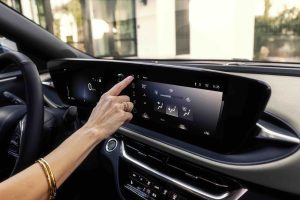
The Preferred comes standard with an “ultrawide” 11 inch diagonal LCD touchscreen that’s integrated with an 8 inch digital-display instrument cluster.
The mid-trim Sport Touring lists for $24,100. This one includes a bundled suite of “Buick Confidence” driver-annoyance (whoops, assistance) technologies, including Automatic Emergency Braking, Front Pedestrian Braking, Forward Collision Alert, Following Distance Indicator, Lane Keep Assist with Lane Departure Warning. Also IntelliBeam auto high beams.
The top-of-the-line Avenir trim comes standard with upgraded interior trim, a 19 inch wheel/tire package and a power-opening rear liftgate.
It stickers for $28,900.
What’s New for 2024
The Envista is a new addition to Buick’s lineup of crossovers.
One of the least expensive new vehicles you can buy.
Though it’s small, it has as much or more first and second-row legroom as a mid-sized car and much more cargo capacity than a full-sized car.
Standard six-speed automatic transmission is not a continuously variable (CVT) automatic.
What’s Not So Good
Tiny engine does not produce much power.
Mediocre gas mileage (28 city, 32 highway) for such a small (and small-engined) vehicle.
AWD is not available.
All Envistas come standard with an engine so small it’s almost not there. Just 1.2 liters and only three cylinders. It generates 136 horsepower and (via the meerakuhl of turbocharging) 162 ft.-lbs. of torque at 2,500 RPM.
A six speed automatic is standard.
All Envistas are front-wheel-drive only.
Probably because if AWD were available, the Envista would need a larger engine. As it is, the front-drive model already weighs an astounding 3,137 lbs. That is very heavy – by historic standards – for a compact-sized vehicle. To get some sense of just how heavy that is, in both real and relative terms, reflect upon the fact that a 1970 Buick Skylark (essentially a posher version of the Chevy Chevelle of the same era) weighed only 3,435 lbs. The word “only” is italicized to emphasize that the Skylark was an almost full-sized car by modern standards and a V8-powered, rear-drive car with a solid cast iron rear axle and a steel perimeter frame (onto which its body was bolted) just like a truck.
The Envista is a front-drive compact with a welded together body and frame (i.e., a unibody) that is powered by a tiny three cylinder engine made of aluminum (not cast iron, like the Skylark’s V8).
And yet it weighs only 300 pounds less.
Where’s Richard Simmons when you need him?
Anyhow, the little Buick’s weight probably explains why it’s front-drive-only. AWD would add 100 or so pounds to that weight and that would be too much weight for a three cylinder engine to move adequately.
Even without the additional weight, the Envista doesn’t move very quickly. It takes about 9 seconds to get to 60, which means a new Prius hybrid – which does the same run in just over 7 seconds) is much quicker.
One would think the compensation here – in the case of the Buick – would be excellent gas mileage as the Envista’s engine is much smaller than the engine in the Prius, which as 2.0 liter four cylinder engine.
Unfortunately, it’s merely mediocre: 28 city, 32 highway.
Note that the Envista’s highway mileage is hardly better than its city mileage. It is usually the case that a given car’s highway mileage will be significantly higher than its city mileage and the reason for this is that once you’re rolling, it doesn’t take that much energy to keep you rolling. But when you haven’t got much power to begin with – and there’s a lot weight to keep rolling – you end up using most of what’s available just to keep you going.
Some good news, though – especially in the context of this class.
The little Buick’s little engine is not paired up with a CVT automatic. This is also why the little Buick’s mileage is less-than-you’d-expect (CVTs, which vary ranges rather than shift through gears) typically up the mileage of a given car with a given engine by 3-4 MPG. But CVTs are less long-term reliable, because the metal band/belt they use to vary ranges inevitably fatigues – and breaks – and many people just don’t like the weird feeling of a transmission that does not change gears and sometimes makes it seem as though something’s wrong, due to the engine revving and holding high RPM during acceleration.
A conventional automatic will upshift to the next-highest gear and that reduces engine RPM (and noise).
This Buick is very different from the Buicks of the past – and that has its good and its bad points.
Being much smaller than the Buick land yachts of the past, it is much more pleasant to drive in urban settings because it is much easier to slip it into tight curbside parking spots than an Electra 225 – which needs a Chevy Suburban-sized hole. It is nimble in a way a big car never can be and the low-RPM torque made by the little engine makes it feel more responsive in stop-and-go traffic than the engine’s modest stats suggest.
A pretty aggressive 3.5:1 final drive ratio helps, too.
It’s surprisingly easy to squeal the tires when accelerating from a dead stop – though this initial power delivery is deceptive, which you’ll discover when you floor it at highway speeds.
And yet, like the big Buicks of the past – this is a very pleasant highway car.
It’s quiet and soft in that Buick way; it may not be able to roar to 60 like a ’70 GS Stage I 455 – but it is much more pleasant-feeling at 80 than the GS was at 60.
Part of this is of course due to the overdrive gearing advantage that the Envista has over its forebears. But it’s also just a better-put-together vehicle. If you take this little Buick for a drive, you will probably be surprised by how big it feels from inside.
It also has an advantage over other small crossovers that are afflicted with continuously variable (CVT) automatics that keep a small, not-very-powerful engine revving at high RPMs rather than upshifting to a higher gear, thus reducing the revs (and the sounds). The Envista’s six speed geared automatic is also probably a better long-term reliability bet.
If the Envista had even a little more engine than other small crossovers, it’d be more like a Buick ought to be.
But even so, it’s remarkably not bad.
At The Curb
It’s small – but doesn’t look as small as it is. That long (relative to its size) wheelbase – the distance between the front and rear axles – helps create a visual impression of more length than is actually there and does just that, here.
And it is not small – inside.
There’s 41.9 inches of legroom for the driver and front seat passenger and nearly 39 inches of legroom in back (38.7 inches, to be exact). These figures are better-than-most relative to most of the others in the class, including the slightly smaller (well, shorter overall) Honda HR-V, which has about an inch less backseat legroom (37.7 inches) and the Toyota Corolla Cross, which only has 32 inches of backseat legroom.
That’s six inches less.
Another comparison might be interesting to make – between this new Buick and the biggest Buick ever, the Electra 225, the latter number proudly touting how long it was, in inches. As opposed to the Envista’s 182.6 inches.
But that’s not the comparison that’s most interesting.
You have probably heard people talk about how those old land yachts had trunks big enough to hold a body wrapped in a carpet, Goodfellas style. And it was true. But this little Buick can hold more . . . well, whatever you need to cart around, believe it or not (as Jack Palance used to say).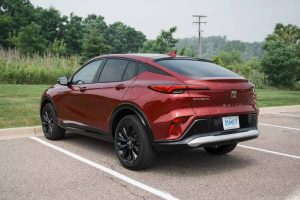
Better yet, believe the stats.
A 1970 Electra 225 had less room in its trunk than the Envista has available – because the Envista (being a crossover) does not have a trunk. It has a cargo area – and if you maximize the space by folding forward the back seats, you will have 42 cubic feet of total space available. Even with the back seats up you’ll have 20.7 cubic feet to work with, which is still more available space than in a 225’s trunk.
This is why small crossovers have largely replaced big cars. Especially since you cannot get big cars anymore. The biggest ones that are still available are small by 225 standards – and their trunks do not have room for a body rolled up in a carpet. Also, the Evista looks more like a fastback wagon than a crossover, which sets it apart from the dreary sea of look-alikes in the parking lot. It’s not going to far to use the word elegant here, either.
The Rest
All Envista trims come standard with that flat-screen instrument cluster integrated with a second flat-screen display for controlling various secondary features, such as climate control AC. It looks fancier – less cheesy – than the more common iPad sprouting from the center stack look that’s typical in many other non-luxury-brand small crossovers.
Even so, I predict that in retrospect – from the vantage point of say five years from now – most of us will remember the LCD touchscreen craze like the bell-bottom cords and platform shoes craze.
A better-than-average six (rather the usual four) speaker stereo is also standard but there is no optional system. If you want better-than-that, you’ll have to do the upgrade via Crutchfield or some such.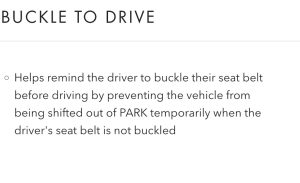
One other thing is also standard – a truly obnoxious electronic seatbelt fuhrer that “reminds” you to “buckle up” by not allowing you to drive – temporarily – until you do. The system holds the transmission gear selector in Park for several annoying seconds. This can be defeated by “buckling up” the seat – and then sitting on the belt.
Or by waiting it out.
It’s doubtful anyone would want this “feature” – and yet, there it is anyhow.
The Bottom Line
It’s weird (in a good way) to find a Buick that costs less than a Honda or a Toyota which is still big in most of the right places, except one.
. . .
If you like what you’ve found here please consider supporting EPautos.
We depend on you to keep the wheels turning!
Our donate button is here.
If you prefer not to use PayPal, our mailing address is:
EPautos
721 Hummingbird Lane SE
Copper Hill, VA 24079
PS: Get an EPautos magnet or sticker or coaster in return for a $20 or more one-time donation or a $10 or more monthly recurring donation. (Please be sure to tell us you want a magnet or sticker or coaster – and also, provide an address, so we know where to mail the thing!)
If you like items like the Keeeeeeeeev! t shirt pictured below, you can find that and more at the EPautos store!



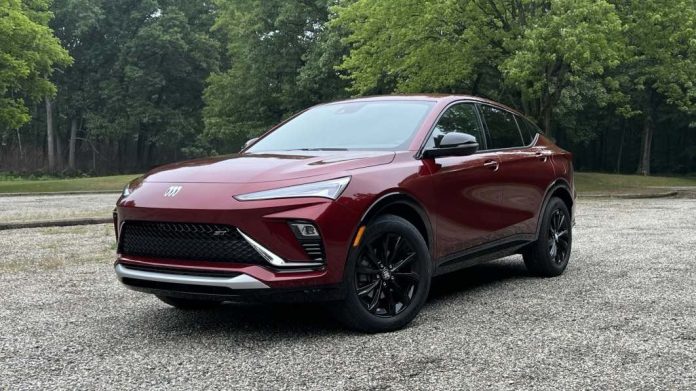

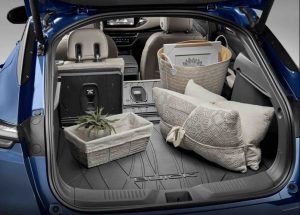
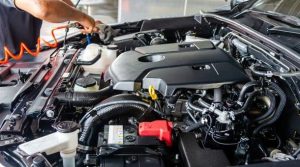

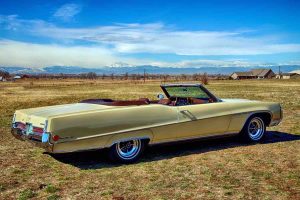
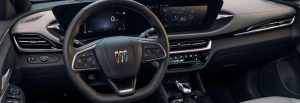







Is it just me or does it look like that Lamborghini SUV thing from that front angle ?! I guess that’s not a bad thingThen I read the “1.2 litre” part !!
Being a Buick with that tiny engine, is it a car adapted from the China market/captive import?
My WWII vet grandfather had a 78 Buick Elctra 225-what a NICE car! That’s back when you could get real cars with real V8 engines…
Eric, you do a truly amazing job of making lemonade out of lemons with the review of the Buick Envista! Yes, there are some characteristics about the crossover that are positive, but overall it highlights (lowlights?) what the automobile industry puts out these days to comply with Uncle.
Thanks, Steve!
I often feel like the undertaker in The Godfather, who is asked by the Don to “use all your powers and skills” . . .
“but once they got to 70 – or 80 – they could hold it effortlessly, with the V8 seemingly half-asleep”… that’s how my 1997 Camaro Z28 feels on the highway in 6th gear at 80 mph, and I love it! The engine is at about 2000 rpm at such speed, and certainly feels half asleep, as if to say, this is a cake walk
This Envista looks like a perfect car for people who hate cars.
Who is Buick even for these days?
Judging by their commercial, people who can’t parallel park. Way to come across as having a pathetic customer base, but I guess that’s who drives now.
Likely designed for the Chinese market where strangely Buick has a bit of well regard.
My 05 Honda Accord is a more attractive vehicle by my not so terribly stringent standards.
I also looked at the Envista, and went with the Subaru Crosstrek because:
1. Subaru’s long range quality is better than GM’s.
2. All wheel drive is available.
3. No turbo to worry about.
4. Holds its value better.
Yeah, the Crosstrek is a slowpoke. But how fast can I legally go anyway? I can’t even make full use of my Outback’s 3.6R engine except on the highway.
Now, if Buick offered AWD and their nearly indestructible 3.8 liter V6, maybe I’d be interested.
Bryce, the old 3.8 is long gone, but I get your drift. It was one of GM’s best. And in supercharger trim, was a great engine, relative. had many in park ave’s, also a great car for it’s day, only FWD was it’s handi-cap.
Yeah, Buick is NOT what it used to be.
And that logo…eewww!
It is fairly cheap….but
Horrible GM quality control, depreciates faster then the Honda or Toyota, tiny over stressed engine won’t last too long.
Turbo replacement when it wears out $5000?….6 speed transaxle replacement $8000?….crappy touch screens don’t last long,…another expensive repair…if you can get the part….just more disposable crap….
lease it for 3 years then turn it back in….
The estimated monthly payment to lease a 2024 Buick Envista Preferred is $380 per month, for 36 months. Total $13,680 3 years…
I would buy a used car for cash…..but if you can write it off….get a lease….
When I think of Buick, I think of Regals and Grand Nationals….I feel old! Well anyway, at least it’s not an EV!
So,,,,,, who is the target market for this?
My guess is the Chinese.
wow! 1.2L that is almost comical. No, it is comical.
My HD pan am 1250 is slightly bigger, with more HP (150), with no forced injection.
I’m sure the turbo’s are required for the torque (162) required to move the thing, vs the HD’s 94 ft-lbs that only has to move 550lbs.
Hmmmmmm……. we have come off the rails.
It’s good to see that GM is providing relatively affordable options like this and the new Chevy Trax. We’ll see how well they sell. It seems these tiny turbocharged 3 cylinder engines are the new standard for many smallish crossovers. I know I wouldn’t buy one. Same with the Ford Escape and Bronco Sport (though they’re 1.5). You have to go to the top of the line trim to get a four cylinder 2.0 liter.
Eric, nice review. I came away with a couple thoughts.
One, that 70 GS is gorgeous. Mine was a stage one convert with factory 4 speed. I wish I hadn’t sold it for college money.
Two, my 81 VW Caddy (Rabbit pickup) with the 1.6 diesel is 42 years old and easily averages 50mpg. And it’s a damned handy pickup, and now wears permanent antique plates. Oddly I think the weight is close to this Buick. But I can open the hood and easily do any service required. We’ve lost so much.
Hmmm… looked it up. My Caddy is 1930 lbs and has a 1100 lb payload, so less than this Buick weighs at the curb even if I’m hauling 2 adults and a big block Chevy in the back!
Envista? I need to change careers & come up with names for cars n drugs.
Probably it’s a contraction of ‘envy, hasta la vista.’
Nobody’s gonna envy the driver of this wheezy little shitbox.
So you did write this review… and I learned a bit more, especially about the size of the cargo area. The weight staggers the mind. Where is it? Certainly not in the engine bay. Maybe the seats are really thick. Maybe the air for the explosive devices is enclosed in cast iron tanks.
Probably it’s in the structure to get it past the crash tests. Anyway, this and the Traxsh will be big sellers due to the price. What else can people afford? Things are gonna get wonky once the UAW strikes.
Hi Scooter,
Yup! I discovered the Buckle-to-Drive feature in the process and figured it warranted a separate article. This little Buick is not a bad car. But it’s sad that Americans have been reduced – literally – to driving such cars. A FWD compact with a three cylinder engine that seats four realistically vs. a huge, V8-powered car that could seat six (plus the body in the trunk).